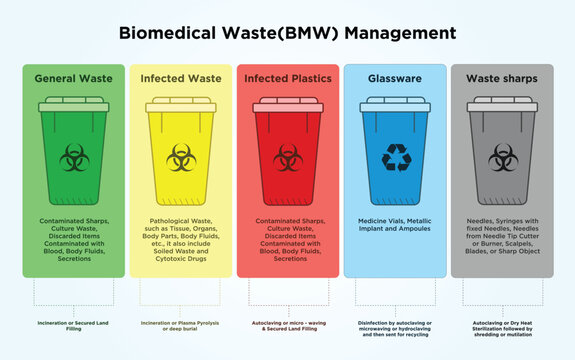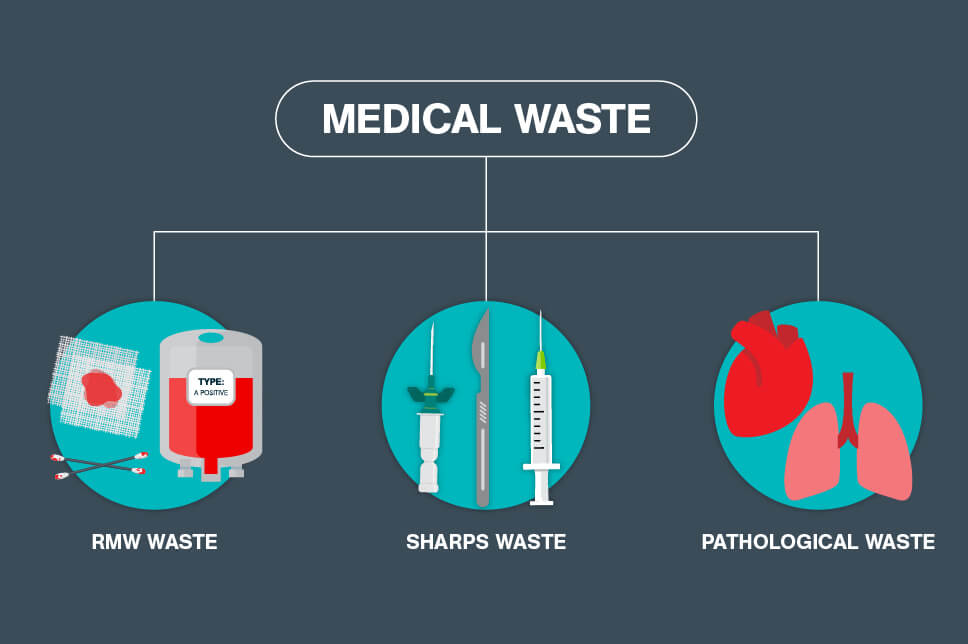Your Ally in Medical Waste Removal: Specialist Service with Environmental Treatment
Wiki Article
Ensuring Safe Handling and Disposal of Medical Waste
Making certain secure handling and disposal of medical waste is of extremely important relevance in health care setups. Improper management of clinical waste can present considerable risks to the environment, public health, and healthcare employees. In this intro, we will certainly check out the value of appropriate clinical waste management, the risks linked with improper handling and disposal, as well as the guidelines and methods that can be executed to guarantee its secure disposal.Significance of Appropriate Medical Waste Management
Proper clinical waste management is of utmost significance in making certain the security and wellness of medical care experts, individuals, and the public. Clinical waste describes any type of waste generated by healthcare centers during the medical diagnosis, therapy, or booster shot of human beings or animals. This waste can posture major health threats if not managed and dealt with effectively.
Among the key factors why proper clinical waste administration is important is to stop the spread of infectious illness. Clinical waste, such as made use of needles, polluted dressings, and organic products, can carry dangerous pathogens. If not taken care of and taken care of properly, these virus can be transmitted to health care employees, clients, waste trainers, and even the basic public, resulting in the prospective break out of illness.
In addition, proper medical waste management helps secure the atmosphere - medical waste disposal service. Clinical waste contains hazardous materials, including chemicals, drugs, and radioactive materials. When not taken care of suitably, these substances can contaminate dirt, water bodies, and the air, posing a significant hazard to ecosystems and public wellness
Moreover, reliable clinical waste management makes certain conformity with global requirements and regional laws. Governments and regulatory bodies have actually developed standards and methods to make sure the safe handling, storage space, transport, and disposal of medical waste. Adhering to these regulations is important to avoid legal effects and keep the credibility and trustworthiness of medical care centers.
Dangers of Improper Handling and Disposal

If medical waste is not appropriately disposed of,Patients can also be exposed to these transmittable diseases. If polluted needles or various other sharps are not disposed of in marked puncture-proof containers, they might accidentally puncture people, leading to possible infections. In addition, if clinical waste is not set apart appropriately, there is a danger of cross-contamination between different types of waste, further enhancing the chances of disease transmission.
Improper disposal of medical waste can additionally have destructive results on the environment and the general public. If clinical waste is not dealt with and thrown away properly, it can contaminate water resources, dirt, and air, resulting in the spread of diseases and toxins. This can have lasting consequences on ecological communities and public wellness.
Guidelines for Safe Handling of Medical Waste
Carrying out effective procedures for the risk-free handling of clinical waste is necessary in making sure the defense of health care professionals, clients, and the basic public. These guidelines are essential in decreasing the risks connected with the handling and disposal of medical waste, such as infections, injuries, and ecological air pollution.Most importantly, health care centers have to establish a comprehensive waste management plan that sticks to regional, national, and global guidelines. This strategy must consist of clear guidelines on waste segregation, product packaging, transportation, labeling, and storage. It is important to separate various kinds of waste, such as sharps, transmittable materials, pharmaceuticals, and non-hazardous waste, to prevent cross-contamination and promote secure disposal.
Additionally, medical care personnel must get thorough training on appropriate waste handling techniques. They should be informed on the prospective threats of clinical waste, the appropriate use of individual safety equipment (PPE), and the appropriate procedures for dealing with, transferring, and getting rid of different kinds of waste.
Additionally, health care facilities must regularly keep track of and audit their waste administration practices to guarantee compliance with guidelines. This includes conducting regular assessments, assessing waste handling procedures, and offering comments and training to employee.
Reliable Strategies for Waste Disposal
To make certain the risk-free handling and disposal of clinical waste, it is important to use efficient approaches for waste disposal. Medical waste can present significant risks to public health and the setting if not managed and gotten rid of effectively. Therefore, healthcare centers and waste administration organizations have to carry out suitable strategies to minimize these dangers.It involves separating various kinds of medical waste based on their qualities. Healthcare centers ought to offer clear standards and training to team participants on how to segregate waste correctly.

Moreover, healthcare facilities must team up with licensed waste management companies to guarantee appropriate disposal of clinical waste. These firms have the proficiency and equipment required check it out to safely deal with and dispose of medical waste in compliance with guidelines and ideal techniques.
Training and Education for Medical Care Professionals
Healthcare specialists play a vital function in making certain the secure handling and disposal of clinical waste with detailed training and education and learning. It is essential for doctor to have a deep understanding of the prospective threats connected with medical waste and the proper protocols for its management. By receiving proper training, healthcare experts can minimize the potential transmission of contagious conditions, prevent environmental contamination, and protect both themselves and the general public.
Additionally, training programs need to emphasize the usage of personal protective tools (PPE) and proper hand health methods when dealing with clinical waste. medical waste disposal. Health care experts need to know exactly how to appropriately use and get rid of of PPE to safeguard themselves from possible direct exposure to hazardous products. They need to also be educated on the value of normal handwashing and the proper use hand sanitizers to lessen the spread of transmittable diseases
Continuing education and learning and routine updates on clinical waste management methods are crucial for medical care professionals. As regulations and standards progress, it is vital to keep health care service providers notified about any adjustments in protocols and best methods. This will make certain that they stay up-to-date and preserve a high requirement of security in disposing and handling of medical waste.
Conclusion
In verdict, correct handling and disposal of clinical waste is vital to make sure the security of healthcare professionals, people, and the setting. By adhering to these techniques, we can alleviate the prospective threats connected with medical waste.Clinical waste refers to any type of waste generated by medical care facilities throughout the diagnosis, treatment, or booster shot of animals or humans. If clinical waste is not segregated properly, there is a threat of cross-contamination between various types of waste, further raising the opportunities of illness transmission.
It is vital to divide different types of waste, such as sharps, infectious materials, pharmaceuticals, and non-hazardous waste, to avoid cross-contamination and promote secure disposal. WasteX Medical Waste Disposal.
To ensure the safe handling and disposal of clinical waste, it is necessary to employ reliable methods for waste disposal. Additionally, medical care facilities should develop a regular waste collection and transport timetable to protect against waste buildup and minimize the danger of mishaps or contamination.
Report this wiki page